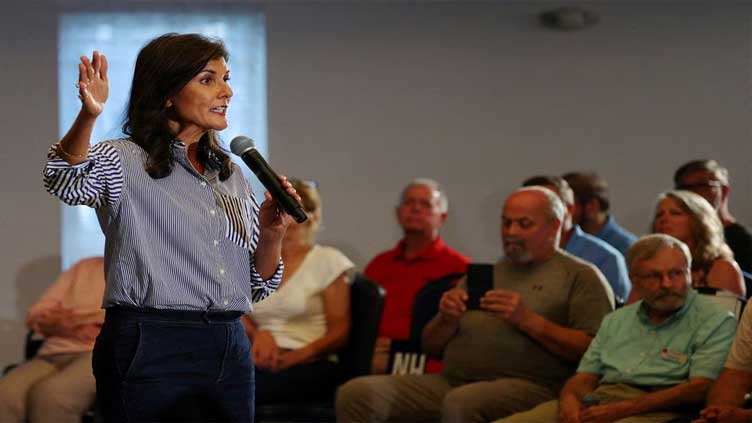Nikki Haley's 2024 White House bid charts hazardous path in isolationist Republican Party

World
Nikki Haley's 2024 White House bid charts hazardous path in isolationist Republican Party
MANCHESTER, New Hampshire (Reuters) - U.S. 2024 Republican presidential contender Nikki Haley wants to send special forces to Mexico to wipe out drug cartels, double down on sending weapons to Ukraine and make sure China understands "there will be hell to pay" if it attacks Taiwan.
The former U.S. ambassador to the United Nations is stubbornly bucking traditional political wisdom that foreign policy does not influence American voters in elections.
Despite opinion polls for the Republican nomination putting Haley in single digits, she is still singularly focused on winning over voters, in large part by pushing her foreign policy vision in a party where isolationism has increasingly taken hold.
This is where Haley differs from many of the other nine contestants for the party's presidential nomination. Her vision for a much more assertive U.S. foreign policy is not just a plank in her campaign, but a huge part of her pitch to voters to elect her the nominee.
Haley acknowledged in an interview with Reuters this week that she is preaching to a divided party, but said she sees her role as educating voters, rather than showing them that she already shared their views.
"If you go to my town halls, you hear me talk about it, and the reason I talk about is because I want Americans to have all the facts," said Haley, who is running fourth among Republicans in most opinion polls.
"When the Americans are given the truth, when they're given all of those facts, then they understand why I'm passionate about it, and why they should care about it as well," said Haley, who served two years as U.N. ambassador under former President Donald Trump.
Haley's stance on military aid to Ukraine after Russia's 2022 invasion in particular puts her at odds with much of her party's rank-and-file. Some 52% of Republicans said in a Reuters/Ipsos poll in July that they were less likely to support a candidate who favors increased military aid to Ukraine.
The campaign is making a strategic wager, advisers said, that Haley's full-throated support for Ukraine is more popular among voters looking to move past Trump than with the Republican Party writ large.
'LET THE CHIPS FALL'
Haley said she uses her town halls to explain to voters that her staunch support for sending more military equipment to Ukraine is to ensure they have what they need to fight the Russians so that U.S. troops never have to be deployed there.
"I go and lay it out there, and let the chips fall where they may," she said.
That position puts her in conflict with rivals, Republican front-runner Trump, Florida Governor Ron DeSantis and tech entrepreneur Vivek Ramaswamy.
Haley's advisers argue that those Republicans least in favor of military aid to Ukraine are more likely to be Trump supporters, so pandering to them is not a sound tactic.
In one memo sent by the campaign to donors and seen by Reuters, campaign manager Betsy Ankney cited comments by DeSantis in March in which he dismissed the Ukraine war as a "territorial dispute," as an example of an opponent trying to appeal to the most dedicated Trump acolytes.
"Many of the people who believe most that we should not be supporting Ukraine are going to be your hard-and-fast Trump voters so they're never going to go with someone else anyways," said one adviser, who requested anonymity.
"The vast majority of the persuadable voters are what you might call 'hawks.'"
At two town halls in New Hampshire, Haley discussed Russia, China and Ukraine at length, as well as other U.S. foes including Iran, Venezuela, and China.
CALL TO ATTACK MEXICO DRUG CARTELS
In her interview with Reuters, she reiterated her willingness to send U.S. special forces into Mexico - without the greenlight of the Mexican government - to attack drug cartels behind the smuggling of the synthetic opioid fentanyl that has fueled drug-related deaths in the United States.
"Well, first you go to the Mexican government, you say, either you do it, or we do it, but you don't wait," she said.
On China, she was no less willing to confront the world's No.2 economy if it sought to invade Taiwan, the democratically governed island that China claims as its own.
"We need to let China know that there will be hell to pay if they touch Taiwan. So are we going to defend Taiwan? We will do whatever we need to defend our friend," Haley said.
Haley has been getting more attention from Republican voters since the first Republican primary debate on Aug. 23, where she strongly asserted the importance of confronting Russia and China. Her support has doubled since then, according to polling averages, but still lingers at about 7%.
In the two New Hampshire town halls, attendees were divided on Haley's foreign policy stances, illustrating the tricky position in which she finds herself. Some attendees cited her support for Ukraine as the reason they supported her.
"I spent 11 years in Europe as a soldier. I know the threat over there, and it will be devastating if (Russia) took over Ukraine," said Al Lepine, 75.
Others cited it as the very reason they were hesitant to vote for Haley.
"I think she's a bit pro-war," said Mike Loftus, a 68-year-old retired engineer. "I think that we shouldn't get involved in all the conflicts around the world."

